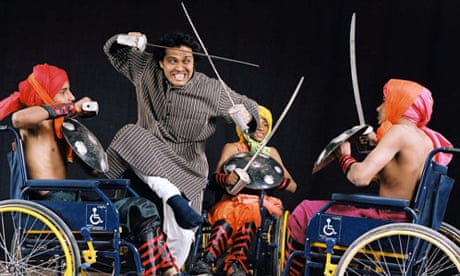I've been bitten, slapped, and hit at various points in time – by my troupe's artists. As a person who runs an international dance production for physically and mentally disabled people, this is, I reckon, a part of the deal. Once during training, I was bitten so hard that I had to be rushed to hospital. Another time, a physically disabled artist slapped me – thwack – full-on during a rehearsal. But these people have taught me the virtues of peace and patience. I have to become one with them, reach their level of understanding during the intensive dance rehearsals, to extract good performances out of them.
Interestingly, training to AU artists is imparted by physically disabled teachers. Everything from lighting to costume designing to stage setting is managed by physically disabled people. We believe in using arts as a vehicle to broaden thinking and resolve issues of inclusion confronting the disabled, which is done through specially-designed professional dance-theatre performance.
To sustain our company we also offer dance theatre classes, choreography classes, summer dance workshops, theatre arts camps, teacher training workshops and specialised classes in Delhi as well as lectures/performances, workshops, residencies and main stage performances across India. We also conduct regular training programs throughout the year for students of all ages with disabilities.
We want dignity for the disabled and their active participation in a more inclusive society. To this end, we work tirelessly to serve up an engaging, but meaningful, cocktail of dance, drama, music and art. My artists don't need mercy. They need opportunity.
When five-year-old Zubair came to me to learn dance, he was like a log of wood. No hands, no legs and barely any torso. His limbless state was an extreme challenge even to an experienced choreographer like me. But as I didn't have the heart to say 'no' to his father, I took little Zubair on as a challenge. I devised a special choreographic technique for him where only his face – which was thankfully very mobile and expressive – and his expressions would be the performance's focus. Later on, I created movements to incorporate whatever limbs he had.
After training Zubair painstakingly for months, I was still apprehensive about the audience's reaction to him. But incredibly, the moment the little boy got onstage, his personality transformed. He shone with such confidence, and so mesmerising was his performance, that the audience simply loved him. When he played the character of a little calf in 'A Kind Tiger and a Sincere Cow' [a folklore production] and a golden deer in 'Ramayana On Wheels', the audience were moved to tears. They gave him a standing ovation. People couldn't believe that this disabled boy could express such difficult emotions with ease.
Similarly, Henry, who was part of my therapeutic theatre workshop in Helsinki (Finland), came to me in a distraught, hyperactive state. He was extremely violent and known to physically abuse people. But after going through my workshops for six months, he calmed down so dramatically that even the doctors were amazed. Such is the power of traditional Indian therapeutic theatre. It works where even medicines fail.
But despite such sporadically exhilarating results, I must confess that the journey has been far from easy. It's quite a challenge to run a theatre for physically disabled people. Traveling is a huge problem in India because we don't have disabled-friendly infrastructure, despite the presence of a whopping 70 million disabled people. Mostly, I end up carrying my artists on my arms. Railway stations, parks, airports and even educational institutions are all extremely disabled-unfriendly. So when we travel we take wheelchairs, crutches, and calipers along with costumes, jewelry, sets and make-up.
Mostly when you visit any vocational training center in India you'll find disabled people engaged in the same humdrum stuff: making paper bags, envelopes, candles, postcards. But at Ability Unlimited we try to nourish the artists' minds, bodies and souls. We select our artists through community workshops by going to slums and then give them therapeutic theatre treatment: dance-movement therapy, music therapy, and motion therapy.
The first thing I teach these people is about their dignity. These children have deep trust in me because I have trust in them. We are like a family. It is very important to have genuine feelings for these special artists. This helps remove the disability barrier and create good artists and good human beings out of them.
Our shows create awareness throughout the world by implanting the message of a 'disabled-free India'. We launched this campaign six months ago and have so far covered 50,000 young students. We believe our dance performances will create a 'barrier-free and disabled-friendly India' one day. We visit schools and give performances with this message. Our target is to convey this message to at least 10 million Indian students.
Our repertoire – which draws upon the rich groundswell of traditional Indian folklore and mythology – includes 'Martial Arts On Wheels', 'Ramayana On Wheels', 'Durga', Bhagawad Gita, and The Panchatantra Tales, among others.
Our Delhi center also acts as a referral center for Asian dance, drama, music and yoga therapy. In addition, our outfit also conducts 'motivational' performances for the corporate sector. Our performances motivate employees to dream big and work hard to make organisational dreams come true. Most companies have a reservoir of potential and talents but they are unaware of their own abilities. Seeing our disabled artists perform so well motivates employees to make optimum use of their potential and capabilities.
